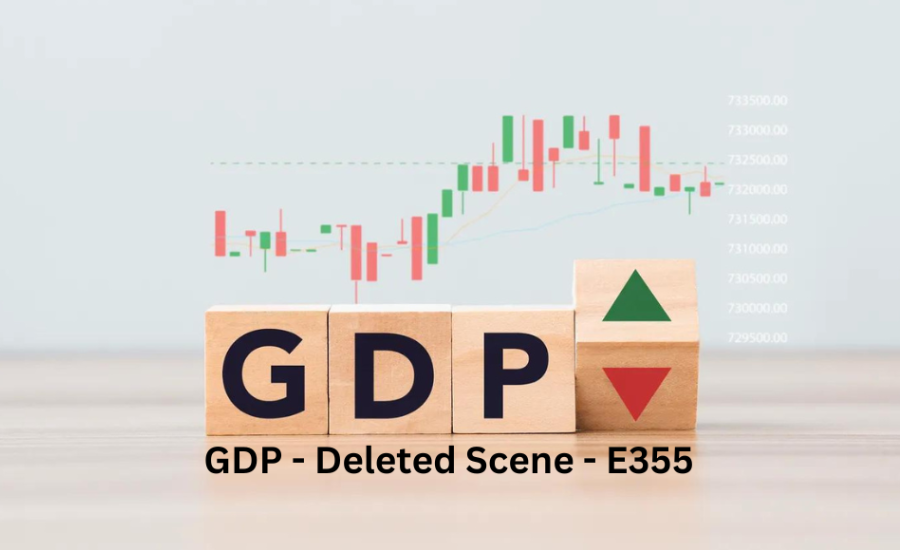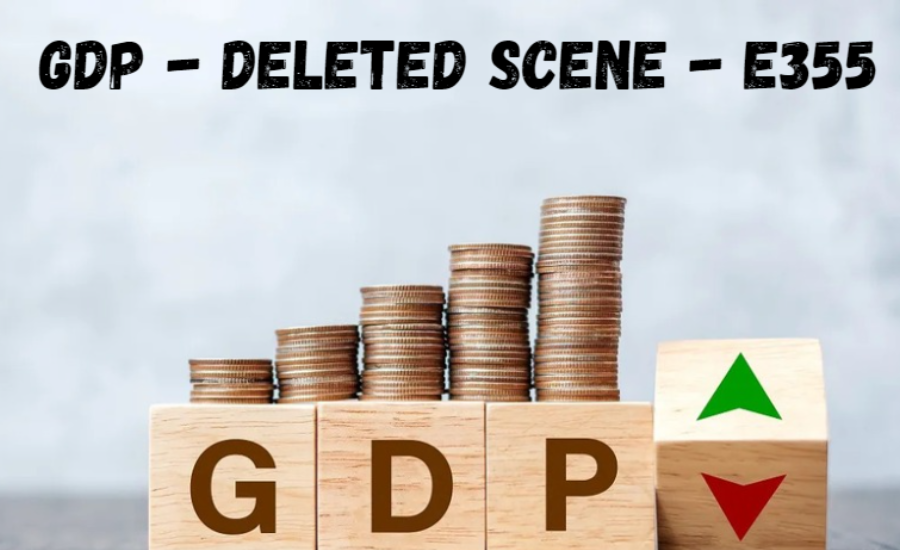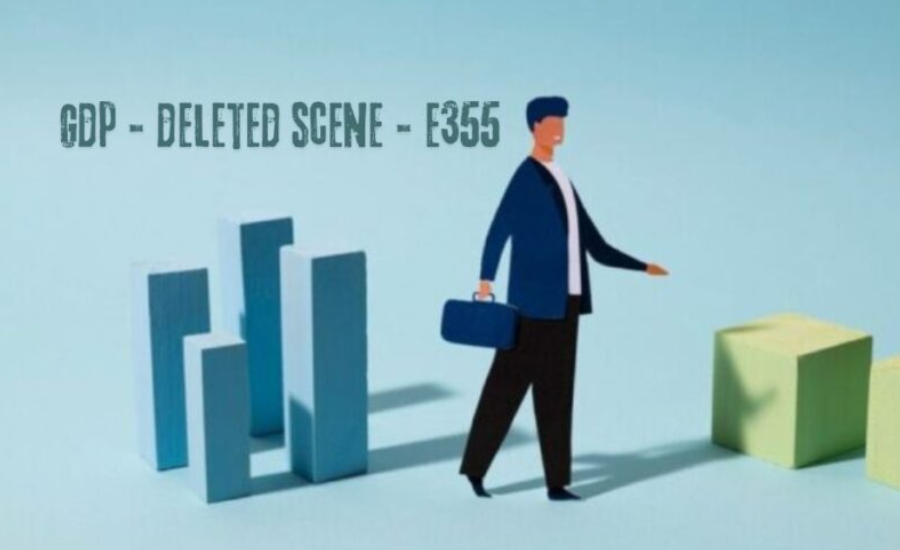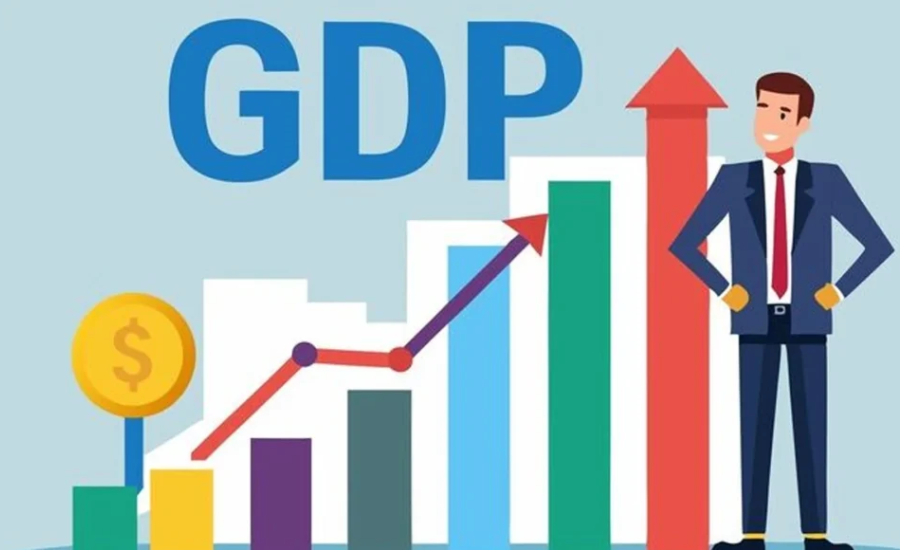August 7, 2024
By Mahtab Hussain
Gross Domestic Product GDP – Deleted Scene – E355 is widely regarded as a cornerstone of economic analysis, serving as a critical measure of a nation’s economic performance. However, the intriguing concept of the “deleted scene” in GDP—denoted as E355—adds a fascinating layer to our understanding of economic activity. This article explores the significance of GDP, dives into the meaning behind the “deleted scene” concept, and examines the implications of E355 for policy, measurement, and global economic assessments.
What Is GDP?

Gross Domestic Product (GDP) is a comprehensive metric that represents the total monetary value of all goods and services produced within a country’s borders over a specific time frame. This measurement is typically calculated on a quarterly or annual basis and serves as a critical indicator of a nation’s economic health. GDP captures the scope of economic activity and provides valuable insights into a country’s productivity, growth rate, and overall economic trajectory.
Economists, businesses, and policymakers rely on GDP to make informed decisions about fiscal policies, investment strategies, and resource allocation. It plays a pivotal role in assessing a nation’s economic performance and guiding efforts to achieve sustainable growth.
The Four Key Components of GDP – Deleted Scene – E355
- Consumption:
This includes all household spending on goods and services, ranging from everyday necessities like food and clothing to luxury items and durable goods such as appliances and vehicles. Consumption typically forms the largest portion of GDP in most countries, reflecting the role of individual spending in driving economic growth. - Investment:
Investment refers to expenditures by businesses on capital goods, such as machinery, equipment, and infrastructure. It also includes residential construction and changes in business inventories. Investments are crucial for fostering long-term economic development and enhancing productivity. - Government Spending:
Government expenditures on public services, infrastructure projects, defense, education, and healthcare are integral components of GDP. These investments contribute to economic stability and growth by supporting essential services and stimulating job creation. - Net Exports:
Net exports represent the balance between a country’s exports and imports. A positive balance (exports exceed imports) contributes to GDP growth, while a negative balance (imports exceed exports) reduces it. This component reflects a nation’s trade relationships and global economic integration.
While GDP is a valuable tool for understanding economic trends, its traditional framework has limitations. It often fails to capture the entirety of economic activity, leading to the emergence of the concept of GDP’s deleted scene, known as E355.
Unpacking The Deleted Scene – E355
The concept of a “deleted scene” in GDP refers to economic activities and contributions that are excluded from standard GDP calculations. These omitted elements, categorized under the label E355, represent dimensions of economic activity that do not fit neatly into traditional metrics. These exclusions reveal significant gaps in how economic performance and societal well-being are measured.
Key Aspects of E355
- Informal Economies:
Informal economies encompass a wide range of activities that operate outside formal regulatory and taxation systems. Examples include unreported income, freelance or gig work, and cash-based transactions that remain undocumented. These activities are especially prominent in developing economies, where informal sectors often provide substantial employment and income opportunities. Despite their importance, informal economies are frequently excluded from GDP calculations, leading to an underrepresentation of a nation’s true economic activity. - Unpaid Work:
Unpaid labor, such as household chores, caregiving, and volunteer services, significantly contributes to societal well-being and economic stability. For example, unpaid caregiving for children, the elderly, or individuals with disabilities reduces the burden on formal healthcare systems and allows for greater workforce participation. However, since these contributions lack direct monetary valuation, they are often left out of GDP metrics, underestimating their economic significance. - Environmental Impacts:
The traditional GDP framework overlooks the costs and benefits associated with environmental resources. Activities like resource depletion, pollution, and unpaid sustainability efforts—such as community-based conservation projects—are not adequately accounted for in GDP. This omission skews the perception of economic growth by ignoring the environmental degradation or restorative actions that directly impact long-term economic and ecological health.
Implications Of E355 In Economic Measurement

The E355 concept highlights the limitations of GDP as a comprehensive measure of economic activity. By excluding informal economies, unpaid work, and environmental impacts, traditional GDP metrics may distort or understate the true scope of a nation’s economic output. These omissions can have profound implications, including:
- Policy Gaps: Excluding significant dimensions of economic activity can lead to misinformed policy decisions. For example, undervaluing unpaid caregiving may result in insufficient support for social welfare programs.
- Skewed Economic Perceptions: The absence of E355 elements from GDP calculations may paint an overly simplistic or inaccurate picture of a nation’s economic health, particularly in regions where informal economies and unpaid labor play a central role.
- Environmental Oversights: Ignoring environmental costs and unpaid sustainability efforts hinders the ability to address long-term ecological challenges, which are integral to sustainable economic development.
Expanding the scope of GDP to include the E355 dimension would create a more holistic and inclusive framework for evaluating economic performance and societal well-being. This broader perspective can drive more equitable and effective policymaking, ultimately benefiting both economies and communities.
Implications Of GDP – Deleted Scene – E355
The concept of GDP’s deleted scene, represented by E355, shines a spotlight on the limitations of Gross Domestic Product as a comprehensive measure of economic activity. By excluding critical yet intangible aspects of economic contributions, such as informal economies, unpaid labor, and environmental impacts, GDP presents an incomplete picture of a nation’s true productivity and societal well-being. Addressing these omissions has far-reaching implications for economic planning, policymaking, and societal progress.
Challenging GDP’s Comprehensiveness
The traditional GDP framework simplifies economic activity into monetary values, omitting several crucial dimensions of productivity and well-being that do not directly involve market transactions. The E355 concept emphasizes these gaps, showcasing how GDP’s narrow scope fails to capture the complexities of economic health.
Key Challenges:
- Incomplete Metrics: Excluding informal economies, unpaid labor, and environmental costs skews the evaluation of national productivity. This omission can lead to underrepresentation of the contributions made by significant portions of the population.
- Overemphasis on Market Transactions: By focusing solely on activities with direct monetary exchanges, GDP disregards the social and environmental dimensions essential for sustainable development.
- Lack of Inclusivity: Populations involved in non-market activities, such as homemakers, caregivers, and those working in informal sectors, remain invisible in GDP assessments, perpetuating inequalities and limiting recognition of their contributions.
By challenging the comprehensiveness of GDP, the E355 concept advocates for a more inclusive and multidimensional approach to measuring economic performance.
Skewed Economic Perceptions
The omissions represented by E355 distort perceptions of economic health and progress, potentially leading to misguided priorities in economic planning and resource allocation.
Undervaluing Informal Economies:
Informal economies, including unregistered businesses, freelance work, and cash transactions, often form a significant part of economic activity, particularly in developing nations. However, these contributions are excluded from GDP metrics, leading to:
- Misguided Policy Responses: Policies may overlook the needs of individuals working in informal sectors, resulting in insufficient support for job creation, infrastructure, and market formalization.
- Underestimation of Economic Resilience: Informal economies often act as safety nets during economic downturns, providing livelihoods and maintaining stability. Their exclusion underestimates a nation’s adaptability and resourcefulness.
Overlooking Unpaid Labor:
Unpaid work, such as caregiving, household chores, and community services, contributes significantly to societal welfare. Its absence from GDP:
- Devalues contributions predominantly made by women, exacerbating gender disparities in economic recognition.
- Ignores the economic value of caregiving, which reduces healthcare costs and supports workforce participation.
By failing to account for these elements, GDP presents an incomplete and often misleading picture of national economic well-being, hindering the creation of equitable and inclusive policies.
Broader Policy Impacts GDP – Deleted Scene – E355

Integrating the E355 concept into economic analyses can transform the way policymakers approach national development, addressing gaps in GDP’s scope and promoting a more equitable distribution of resources.
Reshaping Policy Priorities:
Acknowledging the contributions of informal economies, unpaid labor, and environmental efforts allows for targeted policy interventions:
- Addressing Income Inequality: By incorporating informal sector earnings into economic planning, governments can design more inclusive tax policies and welfare programs.
- Recognizing Unpaid Work: Valuing unpaid caregiving and household labor in national accounts can lead to initiatives that support caregivers, such as subsidized childcare, eldercare services, and flexible work policies.
- Environmental Sustainability: Factoring in environmental impacts within GDP calculations encourages investment in green technologies, conservation efforts, and sustainable resource management.
Formalizing Informal Sectors:
Bringing informal economic activities into the formal sector can:
- Enhance tax revenues and improve public services.
- Provide workers with access to social security, healthcare, and legal protections, improving quality of life and reducing economic vulnerabilities.
Promoting Inclusive Growth:
By integrating E355 into economic frameworks, nations can pursue policies that foster inclusive and sustainable growth. This approach recognizes the value of all contributors, irrespective of whether their efforts are reflected in market transactions.
The Way Forward GDP – Deleted Scene – E355
Incorporating the E355 concept into GDP metrics requires a paradigm shift in economic measurement. Policymakers, economists, and researchers must work together to develop innovative tools and methodologies that capture the hidden dimensions of economic activity. These efforts will ensure that GDP evolves into a more accurate, inclusive, and effective measure of economic health, driving equitable progress for all members of society.
By addressing the omissions highlighted by E355, nations can redefine economic success, focusing on the well-being of people, communities, and the planet as integral components of sustainable growth.
Economic Policy And E355: Transforming Economic Strategy
The concept of E355, representing economic activities excluded from traditional GDP metrics, provides valuable insights for policymakers striving to create more inclusive and equitable strategies. Addressing these “deleted scenes” of the economy enables governments to bridge gaps in economic assessment, promote fairness, and recognize overlooked contributions that drive societal and environmental well-being.
Bridging The Gap: From Omission To Inclusion
Understanding E355 equips policymakers with a broader perspective, empowering them to develop economic policies that account for activities typically excluded from GDP calculations. Recognizing these activities fosters a more accurate representation of national productivity and opens doors to impactful policy interventions.
Enhancing Tax Policies:
The informal economy often operates outside formal taxation systems, leading to lost revenue that could fund public services. Policymakers can:
- Introduce streamlined tax frameworks to integrate informal businesses into the formal sector without imposing excessive burdens.
- Provide incentives, such as access to credit or training programs, to encourage formalization.
- Implement technology-driven solutions, such as digital payment systems, to track and tax informal economic activities.
Developing Targeted Social Programs:
Acknowledging the contributions of unpaid caregiving and household work allows for:
- Direct Support for Caregivers: Initiatives like stipends, tax credits, or pension contributions for unpaid caregivers.
- Accessible Services: Subsidized childcare, eldercare facilities, and healthcare programs to alleviate the burdens of unpaid work.
- Recognition of Economic Value: Inclusion of unpaid labor in national accounts to enhance its visibility and prioritize resources accordingly.
Advocating for Environmental Sustainability:
Environmental depletion and sustainability efforts often remain invisible in GDP metrics. Policymakers can:
- Introduce natural capital accounting systems that quantify the economic value of ecosystems, such as clean water, forests, and biodiversity.
- Implement conservation-driven economic policies, including tax breaks for businesses adopting sustainable practices or penalties for activities that degrade natural resources.
- Support research and development in renewable energy and green technology to balance growth with environmental preservation.
By bridging these gaps, governments can align economic policies with real-world complexities, creating frameworks that reflect both market and non-market contributions to societal progress.
Promoting Equity And Inclusivity: Empowering Marginalized Contributions

The E355 concept also underscores the importance of addressing socioeconomic disparities by incorporating neglected aspects of economic activity into policy planning. Recognizing the roles of marginalized groups fosters equitable growth and ensures that all contributors receive their due acknowledgment and support.
Fostering Inclusive Growth:
Policies informed by E355 can address systemic inequalities by:
- Elevating Unpaid Caregivers: Many unpaid caregivers, often women, are excluded from economic recognition despite their significant contributions. By valuing their work, governments can promote gender equity and enhance their quality of life.
- Empowering Informal Workers: Informal sectors, which frequently consist of marginalized populations, can benefit from initiatives such as skill development programs, microfinancing opportunities, and legal protections.
- Reducing Regional Disparities: Recognizing regional variations in informal economies and unpaid labor allows for tailored policies that address specific community needs.
Ensuring Comprehensive Social Support:
An inclusive approach to economic policy can improve social welfare by:
- Creating universal safety nets, such as healthcare and unemployment benefits, that account for individuals operating outside traditional labor markets.
- Expanding access to education and training for workers in informal sectors, enabling upward mobility and long-term economic stability.
Balancing Economic And Environmental Goals:
Policies that integrate E355 insights encourage a balance between economic development and environmental sustainability. For example:
- Incentivizing eco-friendly farming techniques supports rural workers while preserving ecosystems.
- Recognizing volunteer conservation efforts ensures they are factored into national development strategies.
The Path Forward
Integrating E355 into economic policy transforms the way governments approach growth and development. By addressing the gaps in traditional GDP metrics, policymakers can create strategies that acknowledge and uplift every contributor to the economy, whether their efforts are visible in market transactions or not.
Through enhanced tax systems, targeted social programs, and environmentally conscious policies, the inclusion of E355 ensures that economic strategies foster inclusivity, sustainability, and equity. These efforts pave the way for a more balanced, resilient, and just society, where all contributions—market-based or otherwise—are valued and supported.
The Measurement Challenge: Addressing The Limitations Of Traditional GDP – Deleted Scene – E355
Quantifying E355 presents a complex challenge due to its intangible and often unreported nature. Traditional GDP methods are ill-equipped to capture the full scope of informal economies, unpaid labor, and environmental contributions, leading to significant gaps in understanding national economic performance. To address these limitations, innovative approaches and methodologies are essential to create a more comprehensive picture of economic activity.
Advanced Data Collection: Harnessing Technology For More Accurate Measurements

In the digital age, leveraging modern technologies can provide solutions for tracking informal and non-market contributions that were previously difficult to quantify. Some strategies include:
- Artificial Intelligence (AI): AI-powered tools can process large sets of unstructured data, such as online freelance work, peer-to-peer transactions, or social media engagement, allowing for more accurate estimates of informal activities.
- Big Data Analytics: By analyzing vast amounts of data from mobile apps, online platforms, and transaction records, big data techniques can uncover hidden economic patterns, such as informal trade or unreported income from side gigs.
- Blockchain Technology: Blockchain’s transparency and traceability could be used to track non-market activities, such as volunteer work or unpaid household contributions, enabling a more accurate representation of these activities in economic assessments.
By using such tools, governments can begin to fill in the gaps of traditional economic data and create more precise measures of informal and unpaid activities, better reflecting their role in national economies.
Alternative Metrics: Expanding Beyond GDP – Deleted Scene – E355
While GDP is the most widely used economic indicator, its limitations are increasingly evident, especially when it comes to capturing informal and non-market activities. As a result, alternative metrics have emerged to complement traditional GDP measurements, offering a more nuanced view of economic well-being:
- Human Development Index (HDI): The HDI combines factors like life expectancy, education, and per capita income, providing a more holistic measure of human welfare. It is particularly useful in assessing a country’s quality of life and social progress, moving beyond purely economic data.
- Genuine Progress Indicator (GPI): The GPI adjusts GDP by factoring in environmental costs, income inequality, and non-market activities such as volunteer work and household labor. It seeks to measure whether economic growth is leading to true societal progress or simply inflating monetary values without considering their broader impact.
- Green GDP: This metric incorporates environmental factors into economic assessments, accounting for the costs associated with environmental degradation and resource depletion. It is a critical tool in assessing the long-term sustainability of a nation’s economic growth.
These alternative metrics aim to provide a more comprehensive understanding of economic development, offering a fuller picture of social well-being and sustainability. By incorporating aspects like health, education, and environmental health, these frameworks help bridge the gaps left by traditional GDP measurements.
Global Perspectives on E355: International Collaboration And Solutions
The challenges posed by E355 are not isolated to any one country; they affect economies around the world. The omission of informal economies, unpaid labor, and environmental factors can influence global rankings and international policy decisions, which in turn shape foreign aid, development priorities, and trade agreements. As a result, countries and international organizations are increasingly collaborating to develop consistent methodologies and standards for addressing these gaps.
Global Collaboration And Standardization
- United Nations (UN): The UN has been advocating for the inclusion of non-market activities in global economic assessments. Through initiatives like the System of National Accounts (SNA) and Sustainable Development Goals (SDGs), the UN encourages countries to incorporate environmental, social, and informal economic activities into their economic frameworks.
- World Bank: The World Bank is also at the forefront of pushing for more inclusive economic measures. By conducting research and promoting global standards for measuring informal economies, the World Bank seeks to harmonize the methodologies used by different nations, fostering comparability and consistency.
- International Labour Organization (ILO): The ILO plays a key role in promoting the recognition of informal labor and unpaid care work. Their research highlights the vast contributions of informal sectors to global economies and advocates for policies that incorporate these activities into official economic data.
Promoting Shared Strategies
Global collaboration allows for the sharing of best practices, tools, and methodologies to measure omitted economic activities effectively. Nations can benefit from exchanging experiences and insights into how informal economies, unpaid labor, and environmental contributions can be more accurately quantified. For example, countries that have successfully integrated environmental accounting into their GDP can share their strategies with nations still working to incorporate these practices.
Encouraging Cross-Border Collaboration
As economies become more interconnected, international collaboration is essential for refining GDP methodologies. Cross-border partnerships can help address the challenges of measuring informal activities, particularly in regions where informal sectors dominate. Joint efforts between countries and international organizations can facilitate the development of global standards for data collection, improving the accuracy and consistency of economic measurements across borders.
Conclusion

The concept of GDP – Deleted Scene – E355 invites us to rethink traditional economic metrics, urging a broader perspective on productivity and societal well-being. By acknowledging and addressing these hidden dimensions, policymakers can design strategies that foster more inclusive and sustainable economic growth.
Incorporating E355 insights into GDP offers a pathway to a richer understanding of national economies—one that values not just monetary output, but also the unseen efforts that sustain societies. This shift in focus promises to illuminate untapped potential and redefine success in the global economic landscape.
FAQs On GDP – Deleted Scene – E355
What are the limitations of GDP?
GDP overlooks informal economies, unpaid work, and environmental costs, providing an incomplete view of economic welfare.
How does E355 affect economic decisions?
By highlighting excluded activities, E355 prompts policymakers to consider broader dimensions of economic productivity, influencing tax policies, social welfare, and sustainability initiatives.
Can E355 be measured accurately?
Accurate measurement of E355 requires advanced statistical techniques, innovative data models, and global collaboration.
Why is GDP criticized?
Critics argue that GDP ignores quality of life, inequality, and environmental degradation, limiting its effectiveness as a comprehensive economic indicator.
How can policymakers integrate E355 into planning?
Policymakers can adopt frameworks that recognize unpaid work, formalize informal economies, and incorporate environmental impacts into economic strategies.
Read Next : Adn-237.org
